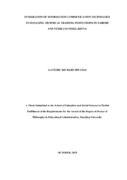| dc.description.abstract | Information and Communication Technology (ICT) is acknowledged as a key driver
for the worldwide economy, particularly in the progressively digitized era of the 21st
century. Educational institutions can no longer effectively prepare students to function
competently in the global economy without properly integrating ICT into their
curriculum. The purpose of this study was to assess the level of integration of ICT in
Technical Training Institutions (TTIs) in Nairobi and Nyeri Counties in Kenya. The
study was guided by the following objectives: to evaluate the level of integration of
ICT in performing administrative functions in Technical Training Institutions in Nyeri
and Nairobi Counties, to examine the level of integration of ICT in conducting
financial management, to assess the level of integration of ICT in instructional
processes and to examine the level of ICT integration in assessment practices in
Technical Training Institutions in Nyeri and Nairobi Counties, Kenya. The study was
guided by the Adaptive Structuration Theory and Technical Pedagogical Content
Knowledge (TPACK) model. The research design utilized in this study was a mixed
methods design. The target population consisted of 1026 respondents. The sample size
was 310 respondents, who included; 290 lecturers, 10 bursars and 10 principals from
the 10 TTIs in the counties of Nairobi and Nyeri. The lecturers were selected using
stratified random sampling, whereas the bursars and principals were selected using
purposive sampling. Questionnaires and interview schedules were used to collect data.
Reliability was tested using Cronbach alpha coefficient. The questionnaire's reliability
was calculated and yielded a Cronbach's alpha (α) of 0.903 in the measurement of ICT
integration while validity was ascertained through factor analysis. Quantitative data
was analyzed using both the descriptive and inferential statistics with the aid of the
Statistical Package for Social Sciences (SPSS) version 24.1. The qualitative data was
analyzed in terms of the themes expressed by the respondents. Results of the study
revealed a statistically significant difference in the level of ICT integration in
administrative functions (t=0.077, p=0.000), financial management (t=0.072,
p=0.000), instructional processes (t=0.0731, p=0.000) and assessment practices
(t=0.0724, p=0.000) in TTIs in Nyeri and Nairobi Counties. This highlights the
varying levels of ICT integration in TTIs in Nyeri and Nairobi Counties. The null
hypothesis was hence rejected. The study recommends the need for the government to
strengthen its ICT policy to facilitate enhanced resource allocation by both the
government and respective institutions, aiming to further deepen the integration of
ICTs in TTIs in Kenya. | en_US |
